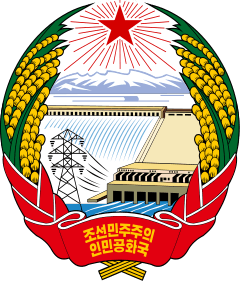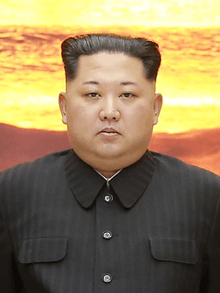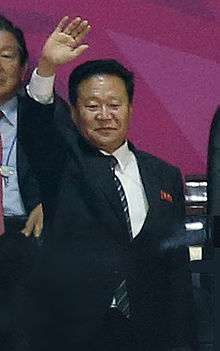Executive Policy Bureau of the Workers' Party of Korea
The Executive Policy Bureau of the Workers' Party of Korea, until the 7th Congress known as the Secretariat, manages the work of the Politburo of the Workers' Party of Korea and its Presidium, headed by the Chairman and made up of the party vice-chairmen.
 |
|---|
| This article is part of a series on the politics and government of North Korea |
|
|
|
|
|
|
Related topics
|
|
|
History
The Secretariat, the forerunner of the Executive Policy Bureau, was established at the 2nd Conference of Representatives in October 1966, and was similar to its counterpart in the Communist Party of the Soviet Union (CPSU) during the Stalin era.[1] The head of the Secretariat at the time was the General Secretary.[1] Until 1966, the WPK had no body similar to the Secretariat; this was unusual, since a Secretariat was one of the most powerful bodies in other ruling communist parties.[1] The Secretariat was established during a power struggle as a means of strengthening Kim Il-sung's control over the party's lower-level organizations; for this reason, a large majority of the first Secretariat members were full or candidate members of the WPK Politburo.[1] After the power struggle ended in 1967–1968, the Secretariat's status waned; this "has been reflected by the lower status of cadres appointed to the Secretariat in recent years", especially at the 6th Congress.[1] At that congress, only three members (out of nine) served concurrently as full Politburo members: Kim Il-sung, Kim Jong-il and Kim Jung-rin (not a Kim family member).[2]
The Secretariat's prestige continued to decline during Kim Jong-il's rule, with five of its twelve members dying during the interregnum between the December 1993 21st Plenary Session of the 6th Central Committee and the 3rd Conference of Representatives in 2010.[3] Of the seven remaining members, three were retired at the 3rd Conference.[3] The four incumbents were Kim Jong-il, Kim Ki-nam (Head of the Propaganda and Agitation Department), Choe Tae-pok (Head of the International Department) and Hong Sok-syong (Head of the Finance and Planning Department).[4]
Seven new members were appointed: Choe Ryong-hae as Secretary for Military Affairs, Mun Kyong-dok as Secretary for Pyongyang Affairs (through his office as Secretary of the WPK Pyongyang City Committee), Pak To-chun as Secretary of Defense Industry, Kim Yong-il as Secretary for International Affairs (assuming Choe Tak-pok's portfolio), Kim Yang-kon as Secretary for South Korean Affairs and Head of the United Front Department, Kim Pyong-hae as Secretary for Personnel and Thae Chong-su as Secretary of General Affairs (through his office as Head of the General Affairs Department).[5] At the 4th Conference, there were no retirements; Kim Kyong-hui (sister of Kim Jong-il) and Kwak Pom-gi were appointed as members and Kim Jong-un, through his office as First Secretary, replaced the late Kim Jong-il.[6]
Role
Along with the Politburo and Central Control Committee, the Bureau is one of the three power organizations subordinate to the Party Central Committee. Also, the Bureau is involved in coordination of the party structure.[7] It has authority in the Worker' Party of Korea, but does not have policy-making influence. The Politburo and its Presidium can elect or appoint officials in the Bureau. According to the charter of the WPK, "The Executive Policy Bureau periodically discusses and decides on the problems of cadres, internal problems of the party, and other tasks of the party, and supervises the execution of party decisions".[8][9]
The body was known as the Secretariat from its establishment in October 1966 to its reorganization into the Executive Policy Bureau at the 7th Congress in May 2016.
Current members
| Chairman | ||
|---|---|---|
| Chairman | Since | |
 |
Kim Jong-un 김정은 (born 1984) |
9 May 2016 |
| Vice Chairman | ||
| Vice Chairman | Since | |
 |
Choe Ryong-hae 최룡해 (born 1950) |
9 May 2016 |
 |
Ri Su-yong 리수용 (born 1940) |
9 May 2016 |
 |
Kim Phyong-hae 김평해 (born 1941) |
9 May 2016 |
 |
O Su-yong 오수용 (born 1944) |
9 May 2016 |
 |
An Jong-su 안정수 (born 1951) |
7 October 2017 |
 |
Choe Hwi 최휘 (born 1954) |
7 October 2017 |
 |
Pak Kwang-ho 박광호 |
7 October 2017 |
 |
Pak Thae-song 박태성 (born 1955) |
7 October 2017 |
 |
Thae Jong-su 태종수 (born 1936) |
7 October 2017 |
 |
Pak Pong-ju 박봉주 (born 1939) |
10 April 2019 |
 |
Ri Il-hwan 리일환 (born 1960) |
31 December 2019 |
 |
Kim Hyong-jun 김형준 (born 1949) |
31 December 2019 |
 |
Ri Pyong-chol 리병철 (born 1948) |
31 December 2019 |
 |
Kim Tok-hun 김덕훈 (born 1961) |
31 December 2019 |
References
Footnotes
- Buzo 1999, p. 34.
- Buzo 1999, p. 35.
- Gause 2011, p. 158.
- Gause 2011, p. 162.
- Gause 2011, pp. 159–162.
- Gause 2013, pp. 41–42.
- "Secretariat of the Workers' Party of Korea in NK Leadership Watch
- Section 26 of Chapter 3 of the WPK Charter
- Seventh Congress of WPK Closes, KCNA, 9 May 2016.
Bibliography
Articles, books and journal entries
- Haggard, Stephen; Herman, Luke; Ryu, Jaesung (July–August 2014). "Political Change in North Korea: Mapping the Succession". Asian Survey. University of California Press. 54 (4): 773–780. doi:10.1525/as.2014.54.4.773. JSTOR 10.1525/as.2014.54.4.773.
- Kim, Nam-Sik (Spring–Summer 1982). "North Korea's Power Structure and Foreign Relations: an Analysis of the Sixth Congress of the KWP". The Journal of East Asian Affairs. Institute for National Security Strategy. 2 (1): 125–151. JSTOR 23253510.
- Staff writer (2012–2014). Understanding North Korea. Ministry of Unification.
Books
- Buzo, Adrian (1999). The Guerilla Dynasty: Politics and Leadership in North Korea. I.B. Tauris. ISBN 1860644147.
- Gause, Ken E. (2011). North Korea Under Kim Chong-il: Power, Politics, and Prospects for Change. ABC-CLIO. ISBN 0313381755.
- — (2013). "The Role and Influence of the Party Apparatus". In Park, Kyung-ae; Snyder, Scott (eds.). North Korea in Transition: Politics, Economy, and Society. Rowman & Littlefield. pp. 19–46. ISBN 1442218126.CS1 maint: ref=harv (link)
- Kim, Samuel (2000). "North Korean Informal Politics". Informal Politics in East Asia. Cambridge University Press. ISBN 0521645387.
- Lankov, Andrei (2007). Crisis in North Korea: The Failure of De-Stalinization, 1956. University of Hawaii Press. ISBN 0824832078.
- Suh, Dae-sook (1988). Kim Il Sung: The North Korean Leader (1st ed.). Columbia University Press. ISBN 0231065736.